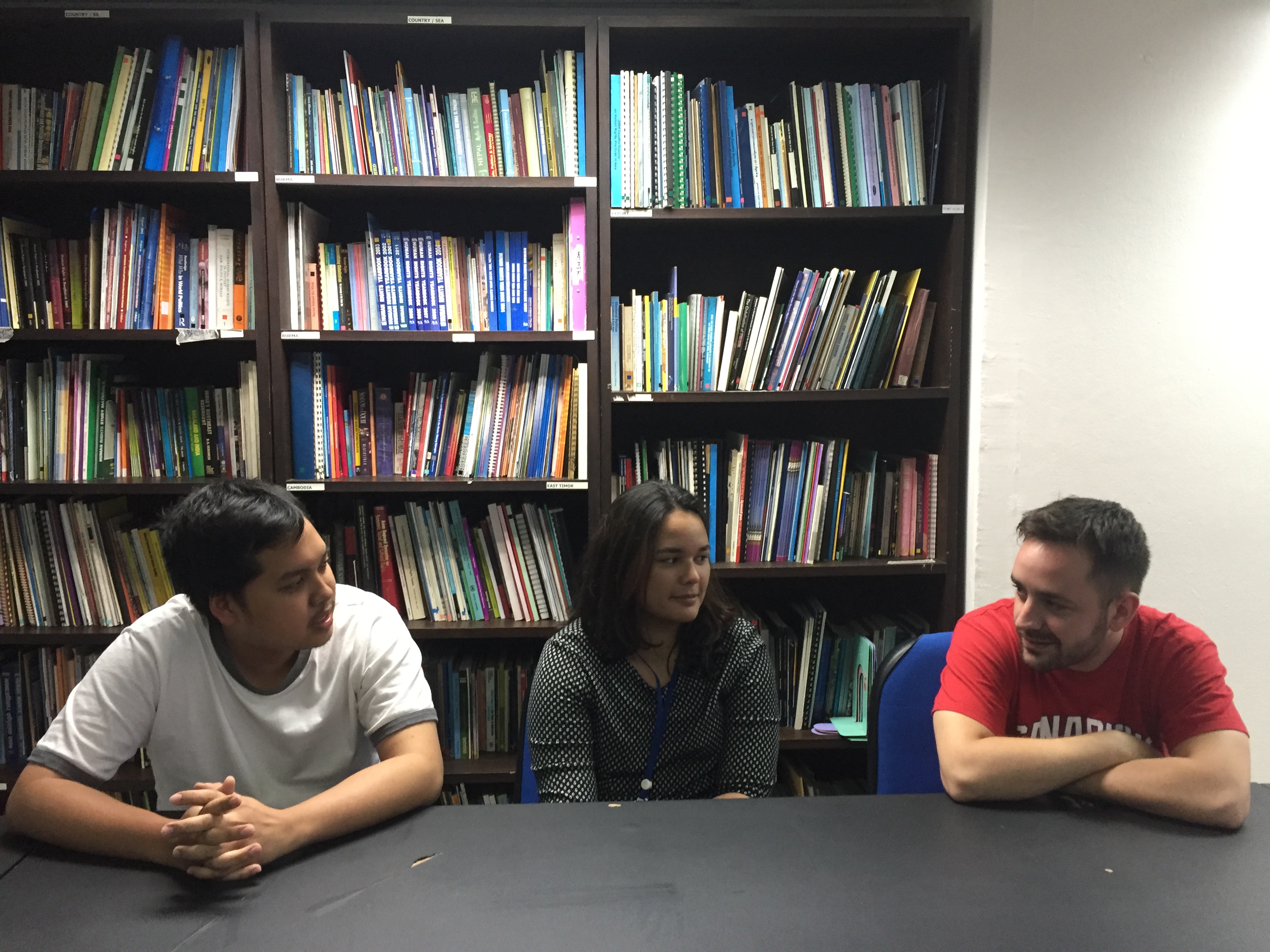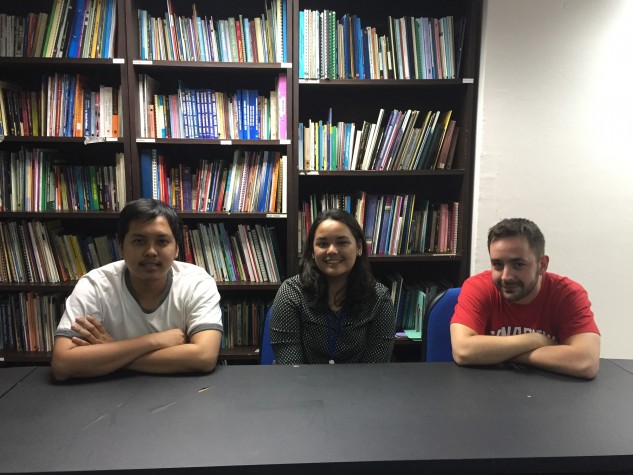For this month’s e-newsletter, we interviewed FORUM-ASIA’s three current interns at the office in Bangkok: Shanna Priangka Ramadhanti (Indonesia), East Asia Programme Intern, Émile Kinley-Gauthier (Canada), United Nations Advocacy Intern, and Oh Wong-Arthichart (Thailand), Information, Communication and Publication Programme Intern. They come from different places, have different backgrounds and different experiences, but they are each very enthusiastic about promoting human rights in Asia. They started their internship in September 2016 and will be with us until March 2017.
Let’s have a look at what motivates them, the challenges they face and what their most memorable moments are of working with FORUM-ASIA.

What is your background and how did you get involved with FORUM-ASIA?
Shanna: My background is in international law. I have always been interested in that, specifically in international human rights law, but I only studied the legal aspect of it. I wanted to learn more about the practical side of human rights. So I decided to join FORUM-ASIA, a human rights organisation, to get first hand experience in the human rights field.
Emile: My interest in human rights was sparked when I visited the Philippines during a gap year before university. I went to the Philippines and met people from social movements, environmentalists, human rights activists, and youth groups. It exposed me to a new world and I was inspired by the dedication and the commitment of these people, who are fighting for their rights. I came back to Montreal and started studying International Studies. I tried to focus on human rights and Southeast Asia as much as possible. Then I did my M.A. in Asian studies in Geneva and that is when I learned about FORUM-ASIA as it has an office located there as well. So, I applied for the internship there and then moved to Bangkok.
Oh: My background is as a student activist. I was an activist from the second year of my Bachelor degree in university. Then last year I was invited by FORUM-ASIA to give a short presentation on the political situation and activism in Thailand. That is how I got to know the organisation. Then I applied for the internship with the communication team here, because of my interest in social media and journalism.
What motivated you to get involved in human rights works?
Shanna: During my studies I learned about many cases of human rights violations, in Indonesia and in Asia overall. I was fascinated by how the human rights law works, especially in Indonesia. Not everyone understands the concept of human rights and how to implement it in Indonesia, this motivated me to learn more, so that one day I can share my experience and knowledge with my colleagues, friends, family, and fellow citizens of Indonesia.
Emile: I was initially interested in getting involved in activism from when I was younger, but I had a hard time finding time for it. So for me, choosing a career in human rights was a way to overcome this difficulty, since my main occupation then becomes a way to contribute to social struggle. Moreover, I would feel unfulfilled if my job was not aimed at making the world a better place. It needs to at least have the purpose of contributing to the fight for equality and social justice.
Oh: It first started when I was an exchange student in Europe during high school. It opened up my world as it was a whole new experiences. Since then, I have always questioned things. Starting from why the traffic is so bad in Thailand, to why the political situation is going down the hill? The curiosity led me to explore more and find out more. I then read books and became interested in history and politics. After I enrolled in university, I joined the political movement and started working on human rights issues as the major demand for Thailand.
What are some of the challenges you faced during your time with FORUM-ASIA? And how did you overcome them?
Shanna: One of the challenge has been that I am very new in this field and also new to the organisation. So, I have had to catch up on many things and learn a lot more about different contexts in Asia which I rarely talked about in university. The good thing is that FORUM-ASIA staff helped me a lot to tackle any challenges. They are very knowledgeable and always willing to help you with anything at any time. So, I think we are in good hands. Aside from asking them, you also have to learn more by yourself, study the current issues, read more news etc, and I can see that with time I have improved.
Emile: The main challenge I have had to face is that I do not have a strong background in law, and of course if you work on human rights, there is a strong law component. But on the bright side, I got to learn more about it and it has been a very beneficial experience. When I get an assignment, I work on it as best as I can, I read a lot and try to get as much knowledge on the issues that I am working on. Then, I draft something and have it edited by my supervisor. I am then able to note what I missed and how to improve for future assignments. So far it has been a very good learning experience and in the end, as an intern, you are here to contribute but also to learn.
Oh: My challenge is probably that I am not that good in English and to be in the communications team here you have to be very good. Also, like many of you, sometimes I have had no background in the particulars of what is going on in different countries. However, with the help of my team, I got to learn more about it and I think I am making progress.
What has been a memorable moment or what moment are you proud of from your internship here?
Shanna: When I was involved with the academic visit of the UN Special Rapporteur on the rights to freedom of peaceful assembly and of association, Maina Kiai. We went to different countries in Southeast Asia and I got to learn a lot about the different situations in Malaysia, Cambodia, the Philippines, and Indonesia. It was very inspiring for me.
Also since I am also working with the National Human Rights Institutions (NHRI) Programme, I had a very memorable experience when I got to help arrange the Asian NGO Network on National Human Rights Institution (ANNI) Conference 2016. It was really interesting to learn about how the different NHRIs function in their respective countries, and also to meet the former Chair of the Global Alliance of National Human Rights Institutions (GANHRI).
Emile: Since I work with the United Nations Advocacy Programme, the impact of my work can be hard to measure as I do not necessarily see changes or improvements immediately. But I try to look at the big picture, at how I, in my own capacity, get to contribute to a larger movement . For example, right now I am drafting a section of a shadow report for the UN Human Rights Committee. I feel grateful to be in a position where I can contribute to defending human rights in Southeast Asia. It is rewarding. For me, doing my part is the most important thing.
Oh: I am very proud that I can contribute to the work of FORUM-ASIA, and to be able to make people know more about human rights and our work through social media. I am very happy that I can leverage my ability to help FORUM-ASIA reach a younger audience through various means of communication.
What are your plans after the internship?
Emile: I hope to find a position, a junior position or an entry level job, in a similar organisation to FORUM-ASIA. I want to keep working in human rights in Asia, or Southeast Asia more specifically. Finding a position that allows me to do that would be ideal.
Shanna: After my internship, I will try to find a job or an internship again in the same field of human rights. One thing I will try to do as well is I will use my legal background to become a lawyer on human rights. Hopefully I can become an international human rights lawyer, but that is kind of hard in Southeast Asia.
Oh: I will finish my Masters and hope to continue working in the human rights field. Ideally in an international organisation.
If you could give a message to the new generation of people working on human rights and development, what would it be?
Emile: It might not be addressed directly to the youth, but more to international organisations working with youth. The most important thing you can do to get youth involved is to provide resources in order to support them. To put them in a position that empowers them, so they are able to provide for themselves while they are working in human rights or development. I am aware that many non-governmental organisations, and even international organisations, are already struggling to get resources to sustain their operations. But I think it is time to find innovative and strategic ways of raising resources in order to support the new generation.
Shanna: The problem of the youth now is that we are mostly ignorant, especially when it comes to human rights. We feel that if it does not affect us, it is not our issue. Why should we care? Human rights might affect certain people more, it may not directly affect you. So, my message is that you should be more open minded and more progressive. Do not stick to your comfort zone. Go out and explore around you, and you will see that people are suffering. And some people are less fortunate than you, but it does not mean that you should not do anything about it. The important thing is to understand the reality that even though it might not affect you now, it might affect you one day. So, better start contributing and start do something now.
Oh: The youth is the future and they are a very important part of society. So, human rights organisation should invest more in the youth. The younger generation of activists nowadays however have quite a narrow perspective and lack of imagination. They cannot see the big picture of the system. My messages are to explore more and learn more about different ideas. And be inspired by the creativeness of other movements in order to be innovative and successful in your own campaigns.
Will you recommend your friends to join FORUM-ASIA as an intern?
Oh: Definitely, I will.
Emile: Yes, I will. I have had a wonderful experience here. It may sound exaggerated, but these have been some of the best months of my life so far, and I definitely recommend it to anyone who is interested in human rights work in Asia. It is a great organisation and I am very happy to be part of it.
Shanna: Yes, definitely. I already did actually. It is a very valuable experience. You will get to learn from many prominent people in this field. So, it is really worth trying it.
For those who are interesting to join our internship programme please check here for the current opening



